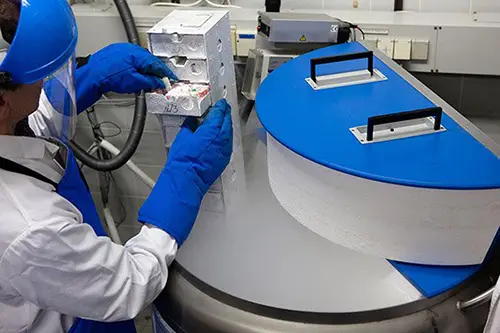
The Main Reason Academic Biobanks Should Provide Biosamples to Industry
The main reason is to improve patient care. Industry plays a vital role in bringing new therapies and diagnostics to the patient. Yet, industry can only achieve this if it can access suitable human biosamples.
Here are some quotes to back up this statement:
From the UK Medical Research Council
‘The development of new drug therapies, and diagnostic and screening tests, to the point where they can be made sufficiently widely available to benefit human health, is crucially dependent on commercial involvement. Therefore access by the commercial sector to samples of human material collected in the course of MRC-funded research should be facilitated, where this is consistent with our mission.’ Human Tissue and Biological Samples for use in Research – Medical Research Council (MRC) Ethics Series. Section 4.1
From the Research Council of Norway
‘The involvement of commercial companies seems crucial for realising the potential within biobanks to contribute to better diagnostics and improved drugs’. Research Council of Norway. 2008. Gode biobanker—Bedre helse. [Good biobanks—Better health]. Forskningsra ̊ det. Oslo.
From Comment on New England Journal of Medicine (NEJM) Article
‘Private sector discoveries account for 80 – 90% of pharmaceutical products … The discovery and development of new drugs, medicines, and vaccines to solve unmet medical needs is an extremely long and expensive process … Commercial companies have the funds, the expertise and the experience to take a potential product from bench to market.’ Policy and Medicine (2011).
From ‘Modern Biopharmaceuticals: Recent Success Stories’
‘Progress from basic research to advances in patient care, including ‘analysis of correlation and causation between genes and diseases leading to innovative pharmaceuticals, including aspects such as pharmacogenetics/ pharmacogenomics in drug development, genetic variation as a key to personalized medicine, and systems biology approaches to target identification and validation for drug discovery, is unthinkable without access to well-annotated patient samples’. Swifka, Janine, Khusru Asadullah and Arndt A. P. Schmitz. “Pharma Research Biobanking: Need, Socioethical Considerations, and Best Practice.” In Modern Biopharmaceuticals: Recent Success Stories, by Dr. Jörg Knäblein. Wiley VCH Verlag GmbH & Co. KGaA, 2013.
A Moral Responsibility For Academic Biobanks & Non-Commercial Biobanks
Biobanks in the public sector are the primary gatekeepers for human biosample access. They receive public funding to support medical research for the public good. This medical research must occur in both public and private (commercial) sectors. So, public sector biobanks have a moral responsibility to supply the private sector. That is to say, to supply pharmaceutical and biotechnology industries. The level of support these biobanks provide to the private sector is one measure of their worth.
A Proposal To Encourage Best Practice In Academic Biobanks
Here is a proposal to encourage best practices. The level of support provided to industry should be a key performance indicator (KPI). For example, a biobank KPI could be the number of industry projects supported per year. Alternatively, it could be the number of samples provided to the sector per year.
Another Reason Why Academic Biobanks Should Provide Biosamples to Industry
There is another reason why public sector biobanks should provide biosamples to industry. That is to generate funding to ensure the biobank’s financial sustainability. We will discuss this in other posts.
This article is on the Biosample Hub blog. Other posts in this blog include:
- Why Academic / Hospital Biobanks Should Provide Biosamples to Industry
- Ensuring Public Support For Biobank Cooperation With Industry
- The Main Actors Providing Biosamples To Industry
- Biosample Needs of Different Industry Players
- The Dual Role of Academic Biobanks
- What is Commodification?
- Acceptable Transactions in Biobanking
- Why Biobank Access Policies Should Be Publicly Available
- Biospecimen Provenance: What Researchers Need To Know
The Biosample Hub platform https://biosamplehub.org/ encourages ethical sourcing of biosamples for the industry sector.
